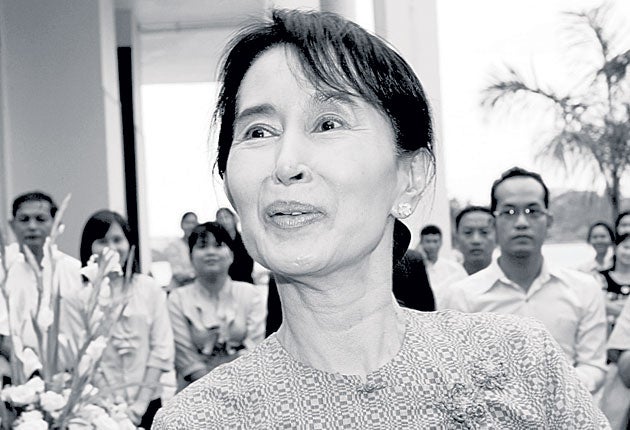Suu Kyi release would awaken Burma, says ally

The anticipated release from house arrest of Burmese democracy leader Aung San Suu Kyi next month will stir a "political reawakening" in the country after half a century of military rule, her close ally Win Tin told The Independent.
"Aung San Suu Kyi's release will be like a great rain. When the monsoon comes to Burma it brings the whole countryside to life. When she is released the Burmese people will be reawakened," Win Tin, one of the founding members of Ms Suu Kyi's National League for Democracy (NLD), said in Rangoon.
Ms Suu Kyi is due to be released from house arrest in Rangoon on 13 November. The date marks the end of an 18-month sentence for breaking the rules of her detention when she offered shelter to an eccentric American man who swam, uninvited, to her lakeside home.
The offence was simply the latest in a series of alleged misdemeanours that the military has identified in order to keep the Nobel peace laureate in detention for 15 of the last 21 years.
The most recent term of detention was carefully calibrated to ensure Ms Suu Kyi would be kept out of the picture until Burma's first election in two decades, to be held on 7 November, was safely wrapped up in the military's favour.
South-east Asia's top diplomats yesterday demanded that Aung San Suu Kyi be freed before the elections. Meanwhile, the UN secretary general Ban Ki-moon said that by freeing its jailed dissidents, Burma could create a "perception that this election will be more inclusive", even if it's too late for the dissidents to run as candidates or to vote.
Like his mentor Ms Suu Kyi, the 81-year-old Win Tin has spent many years imprisoned for his political beliefs.
After 19 years in jail, most of them spent in solitary confinement in Rangoon's notorious Insein prison, he was finally freed in 2008 and immediately resumed his dissident activities.
While his years of resistance mark him out as one of the most courageous leaders of Burma's democracy movement, Win Tin still believes that the only person who can oust the ruling generals is the charismatic Ms Suu Kyi, the daughter of Burma's revered independence fighter General Aung San.
"I can confront the junta personally but I cannot organise other people to do the same," said Win Tin, bright and energetic despite the years of beatings and abuse that he suffered in jail. "Only she can do that. She is the only one who can uproot this junta."
Ms Suu Kyi was unable to stand in the election, and her party has called for a boycott, citing gross unfairness in the electoral process. Despite the participation of several small opposition parties, including a breakaway group of NLD members, the pro-junta Union Solidarity and Development Party is heading for a convincing win – mostly because it is the only party with enough funds to put up candidates in all constituencies.
"There are so many things that are unfair about this election. We don't believe it's a real political solution. It will just help the military to get what they want – to rule for a century or more," said Win Tin.
Even if things do go smoothly for the regime, Ms Suu Kyi's release is by no means assured. Although government officials have acknowledged that she will have completed her sentence on 13 November, the decision to free her will be ultimately made by the country's top general Than Shwe, who could come up with any number of excuses to keep Ms Suu Kyi, 65, behind bars. Burma has confirmed that Than Shwe himself will not run in the elections as the military regime attempts to present a new image to the world.
Win Tin himself can only hope. He has not seen Ms Suu Kyi since the morning of his arrest on charges of treason in 1989, a year before the NLD won a landslide victory in the last national elections, a result that was ignored by the generals who refused to give up power. Despite the passing years, Win Tin's memories of his political icon are still vivid.
"She drew crowds that were a mile deep. People could not see her, but they came anyway. There was hope and expectation and I pray I will see this again," he said. "She is great. She is wise and committed, hard-working and far-sighted. We believe she can lead our country."
Win Tin: a life in brief: The poet devoted to democracy
When Win Tin went to prison, he was a poet, editor and close aide to Aung San Suu Kyi at the tail end of middle age. When he came out again, he was an old man – and an activist hero second only to Suu Kyi as a symbol of the fight for democracy in Burma.
Win Tin was jailed in 1989 for three years – and then had his sentence twice extended, once for "publishing anti-government propaganda" from inside the infamous Insein prison. He had heart attacks, a slipped disc, and lost most of his teeth in prison. Yet asked to resign from the National League for Democracy in exchange for his release, he refused.
When he was finally freed in 2008, as part of a wider release of prisoners the government termed "a gesture of loving kindness and goodwill", he was the country's longest-serving political prisoner. But he immediately returned to political activism, relaunching weekly meetings of his party that had fizzled out after he and Suu Kyi were jailed.
Subscribe to Independent Premium to bookmark this article
Want to bookmark your favourite articles and stories to read or reference later? Start your Independent Premium subscription today.

Join our commenting forum
Join thought-provoking conversations, follow other Independent readers and see their replies